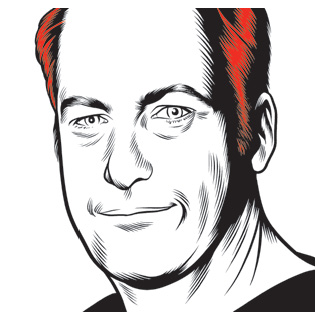Robert Smigel blew off dental school and moved to Chicago, the home of the Second City Theatre, because he loved sketch comedy and wanted to make it his job. Within two years he was the lead writer of a theater revue (All You Can Eat and the Temple of Dooom) that was a hit and got him hired at Saturday Night Live.
When I met him I was a student of sketch in Chicago and writing my own craziness with numerous groups. Robert liked my notions, we hit it off, I moved into the theater crash-pad he shared with other fringy actor types, and we started planning a show we would write together. He was hired at SNL before we got too far. Two years later I joined the staff there and got my ass kicked around the block. Robert, however, did fantastically well, writing many of the most memorable sketches of the Downey Jr. through Carvey through Sandler years: The “Cliffhanger” sketch that ended the ’85-’86 season, William Shatner’s “Get a life!” nerd-fest sketch, “The McLaughlin Group,” “Cluckin’ Chicken,” “Da Bears Fans,” and “Schmitt's Gay Beer.” Beyond the legendary sketches, there are countless super-funny unheralded pieces that would make a boxed set of best-ofs. I was there when he wrote many of these and it was intimidating to observe.
You have reached your article limit
Sign up for a digital subscription and continue reading all new issues, plus our entire archives, for just $1.50/month.
Already a subscriber? Sign in





